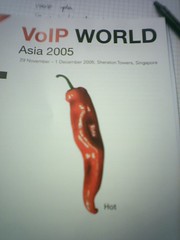(NOTE: My previous version was a bit harsh, so I have toned it down - it was Halloween and I was feeling beastly.)
For those more inclined to be in the Bubble 2.0 camp, rather than its more charitable Web 2.0 counterpart, here's some additional fuel for your scepticism. This blog is apparently worthless. This is an interesting concept, harnessing a recent transaction to use as a comparable valuation benchmark, but before Wall St. M&A teams rush out and start using it, a word of warning: it doesn't work very well, presumably due to the source data, rather than the execution of the tool itself.
My good cyberbuddy Om Malik's blog is worth $1.15m, and worth every damned penny, while Martin Geddes' amazing efforts are worth a paltry $71k, and my uber-cyber-freund Richard Stastny's blog is worth only a scandalous $27k. What I find particularly amusing is that my blog is number 7 on Om Malik's "must read" list, yet it is invisible, i.e., there is no value attributed to association with, or referrals from, trusted parties. Meanwhile, I have 252 subscribers in Bloglines, a growing number of referrals coming from MyYahoo!, GoogleLens, NewsGator, and other sources, as well as lots of search-related hits. My crude estimate is somewhere in the neighborhood of 1,000 unique daily readers. I'm not in the habit of blowing my own horn, except for internally near bonus time (unfortunately management are somewhat hard-of-hearing), but this level of readership clearly can't have zero value. It would seem that the blogosphere, in striving to find ways to track and quantify itself, is (for now) falling prey to the same "islands of connectivity" fallacy as have the major IM and VoIP players: if we don't see it, it isn't there.
Perhaps some day my true value may be realized and someone will pay me not to blog!
Tags: fallacies, walled garden
UPDATE: the Mother of all Palladium Club mega-value readers writes in with the following observations:
The reason for your zero valuation is because Technorati have no ranking information available for you. However, the Technorati ranking system appears to me to be based purely on other sources linking to you, and you can gather similar information using a search engine such as Yahoo! (Google is unreliable for searching site interlinkage). Now, if you narrow the links reported down to those from blogs by ensuring that we at least have the word "blog" on each linkee page, and removing your own pages from the search, we end up with this query:
linkdomain:eurotelcoblog.blogspot.com "blog"
-site:eurotelcoblog.blogspot.com
Type that into Yahoo! and you'll see a result set of 13,300 pages linking to your blog, probably from other blogs. Based on the lower AOL valuation figure according to this source.... at $25m, the figure is about $564 per link. I contend that this is just as accurate as any such other scoring mechanism in use, and on this basis the true value of EuroTelcoblog is......... (drum roll)
$7,501,200
As I'm now a paper millionaire, this blog is officially for sale, and I am going home early tonight to tell the family that Christmas isn't cancelled afterall.










